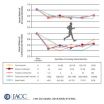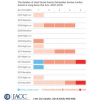(Press-News.org) Dr. Nicole R. Fowler and her fellow reserachers have found that patients with dementia were more likely to receive a pacemaker then patients without cognitive impairment.
Older adults with mild cognitive impairment (MCI) and dementia can have co-existing cardiac illnesses and that makes them eligible for therapy with devices to correct rhythm abnormalities. But the risks and benefits need to be weighed carefully with patients, families and clinicians.
The authors examined data from the National Alzheimer Coordinating Center Uniform Data Set gathered from 33 Alzheimer Disease Centers from September 2005 through December 2011. There were 16,245 participants with a baseline visit and at least one follow-up.
At baseline, 7,446 participants (45.8 percent) had no cognitive impairment, 3,460 (21.3 percent) had MCI and 5,339 (32.9 percent) had dementia. Participants who had dementia at the visit before being assessed for a pacemaker were 1.6 times more likely to receive a pacemaker compared with participants without cognitive impairment and participants with MCI were 1.2 times more likely. Over the seven-year study period, rates of pacemakers were 4 per 1,000 person-years for participants without cognitive impairment, 4.7 per 1,000 person-years for participants with MCI and 6.5 per 1,000 person-years for participants with dementia.
Patients with dementia were more likely to receive a pacemaker than patients without cognitive impairment, even after adjusting for clinical risk factors. This runs counter to the normative expectation that patients with a serious life-limiting and cognitively disabling illness might be treated less aggressively. While it is possible that unmeasured confounding by indication explains this observation, future research should explore the patient, caregiver and clinician influences on decision making regarding cardiac devices in this population.
INFORMATION:
JAMA Intern Med. Published online July 21, 2014. doi:10.1001/jamainternmed.2014.3450.
This study was supported by grants from the Agency for Healthcare Research and Quality and the National Institutes of Health, National Institute on Aging. Please see the article for additional information, including other authors, author contributions and affiliations, financial disclosures, funding and support, etc.
Research letter examines pacemaker use in patients with cognitive impairment
2014-07-28
ELSE PRESS RELEASES FROM THIS DATE:
Electronic screening tool to triage teenagers and risk of substance misuse
2014-07-28
Bottom Line: An electronic screening tool that starts with a single question to assess the frequency of substance misuse appears to be an easy way to screen teenagers who visited a physician for routine medical care.
Author: Sharon Levy, M.D., M.P.H., of Boston Children's Hospital, and colleagues.
Background: Substance use can cause illness and death in adolescents. Screening adolescents and intervening if there is substance use can reduce the burden of addiction. The American Academy of Pediatrics and other professional organizations recommend that primary care physicians ...
Dementia patients more likely to get implanted pacemakers, says Pitt study
2014-07-28
PITTSBURGH, July 28, 2014 -- People with dementia are more likely to get implanted pacemakers for heart rhythm irregularities, such as atrial fibrillation, than people who don't have cognitive difficulties, according to researchers at the University of Pittsburgh School of Medicine. In a research letter published online today in JAMA Internal Medicine, the researchers noted the finding runs counter to expectations that less aggressive interventions are the norm for patients with the incurable and disabling illness.
To look at the relationships between cognitive status ...
Non-endoscopic migraine surgery provides significant symptom relief
2014-07-28
A revised version of a surgical procedure to treat severe chronic migraine headaches led to significant symptom relief more than 90 percent of the time in patients treated at Massachusetts General Hospital (MGH). Physicians from the MGH Division of Plastic and Reconstructive Surgery report that more than half of 35 patients treated with the non-endoscopic procedure – all of whom had headaches associated with compression of craniofacial nerves – reported complete symptom relief a year later. The team's paper has received advance online publication in the journal Plastic ...
Gender disparities in cognition will not diminish
2014-07-28
The study, published in the Proceedings of the National Academy of Science, investigated the extent to which improvements in living conditions and educational opportunities over a person's life affect cognitive abilities and their implications for men and women.
"Our results show that there is no reason to expect all cognitive gender differences will diminish," says Daniela Weber, IIASA researcher and lead author of the study. "However, the findings from this study suggest that if women and men had equal levels of education, then we should expect a female advantage in ...
Running reduces risk of death regardless of duration, speed
2014-07-28
Running for only a few minutes a day or at slow speeds may significantly reduce a person's risk of death from cardiovascular disease compared to someone who does not run, according to a study published today in the Journal of the American College of Cardiology.
Exercise is well-established as way to prevent heart disease and it is component of an overall healthy life, but it is unclear whether there are health benefits below the level of 75 minutes per week of vigorous-intensity activity, such as running, recommended by the U.S. government and World Health Organization.
Researchers ...
Endurance runners more likely to die of heat stroke than heart condition
2014-07-28
Heat stroke is 10 times more likely than cardiac events to be life-threatening for runners during endurance races in warm climates, according to a study published today in the Journal of the American College of Cardiology. The authors noted the findings may play a role in the ongoing debate over pre-participation ECG screenings for preventing sudden death in athletes by offering a new perspective on the greatest health risk for runners.
Two of the most recognized causes of sudden death during an endurance race are arrhythmic death, sudden death usually caused by undetected ...
Learning the smell of fear: Mothers teach babies their own fears via odor, research finds
2014-07-28
ANN ARBOR, Mich. — Babies can learn what to fear in the first days of life just by smelling the odor of their distressed mothers, new research suggests. And not just "natural" fears: If a mother experienced something before pregnancy that made her fear something specific, her baby will quickly learn to fear it too -- through the odor she gives off when she feels fear.
In the first direct observation of this kind of fear transmission, a team of University of Michigan Medical School and New York University studied mother rats who had learned to fear the smell of peppermint ...
New study confirms water vapor as global warming amplifier
2014-07-28
MIAMI – A new study from scientists at the University of Miami Rosenstiel School of Marine and Atmospheric Science and colleagues confirms rising levels of water vapor in the upper troposphere – a key amplifier of global warming – will intensify climate change impacts over the next decades. The new study is the first to show that increased water vapor concentrations in the atmosphere are a direct result of human activities.
"The study is the first to confirm that human activities have increased water vapor in the upper troposphere," said Brian Soden, professor of atmospheric ...
Impact of Deepwater Horizon oil spill on coral is deeper and broader than predicted
2014-07-28
A new discovery of two additional coral communities showing signs of damage from the Deepwater Horizon oil spill expands the impact footprint of the 2010 spill in the Gulf of Mexico. The discovery was made by a team led by Charles Fisher, professor of biology at Penn State University. A paper describing this work and additional impacts of human activity on corals in the Gulf of Mexico will be published during the last week of July 2014 in the online Early Edition of the journal Proceedings of the National Academy of Sciences.
"The footprint of the impact of the spill ...
The bit of your brain that signals how bad things could be
2014-07-28
An evolutionarily ancient and tiny part of the brain tracks expectations about nasty events, finds new UCL research.
The study, published in Proceedings of the National Academy of Sciences, demonstrates for the first time that the human habenula, half the size of a pea, tracks predictions about negative events, like painful electric shocks, suggesting a role in learning from bad experiences.
Brain scans from 23 healthy volunteers showed that the habenula activates in response to pictures associated with painful electric shocks, with the opposite occurring for pictures ...



